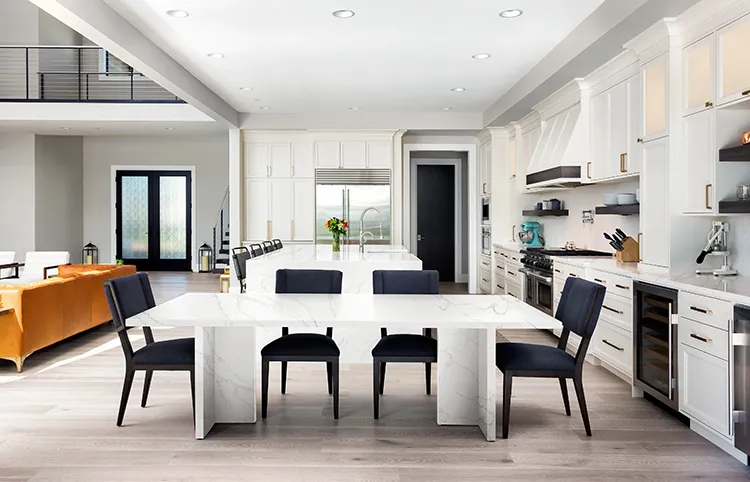
Quartz countertops have become a popular choice in modern homes, but no matter how sleek and stylish it looks, it is not a mythical perfect material. Questions and misunderstandings about quartz countertops often come up in renovation discussions.
This article will provide you with a comprehensive guide to quartz countertops by answering 12 common questions to help you better understand this popular countertop choice.
Table of Contents
1. What do quartz countertops look like?
2. Does quartz stain more easily than granite?
3. What do you need to know about quartz countertops?
4. What are the most popular quartz countertop colors?
5. What are the most popular quartz colors for kitchens?
6. What are the disadvantages of quartz countertops?
7. Can you put a hot pot on quartz?
8. What are the guidelines for quartz countertops?
9. Are quartz countertops high maintenance?
10. Does quartz yellow over time?
11. Does white quartz scratch easily?
12. Can you put a hot cup of coffee on quartz?
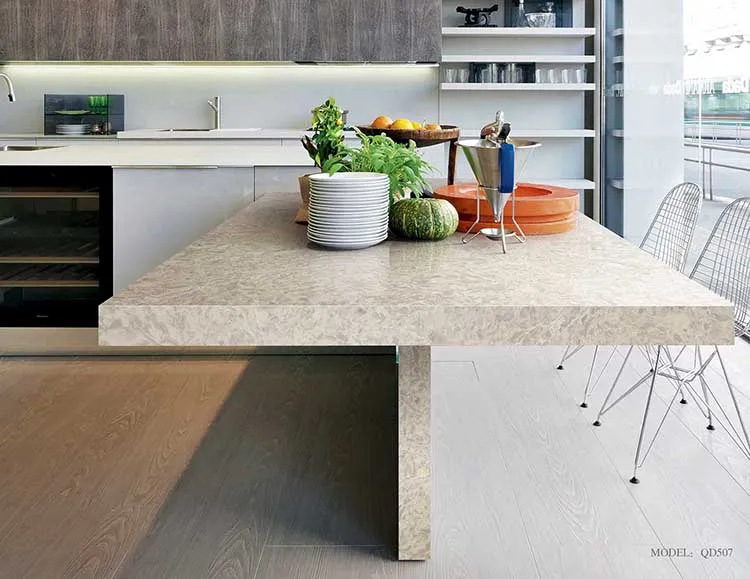
What Do Quartz Countertops Look Like?
Quartz countertops generally give people a luxurious, modern and stylish impression. They are made of about 90-95% natural quartz mixed with resins and other ingredients. This combination gives quartz not only the beauty of natural stone, but also the superior performance of man-made materials. The most notable feature is their uniform appearance, without obvious natural flaws or cracks like marble or granite.
Quartz countertops have a smooth surface and can be created in a variety of colors and textures according to different manufacturing processes. Whether you like white, marble texture or dark quartz, there are abundant options on the market. Because quartz is processed through engineering, it can be customized precisely to the designer's requirements, whether it is a minimalist modern kitchen or a gorgeous bathroom, quartz can perfectly blend in.
Quartz countertops also have a striking advantage - non-porous structure. This means that it will not absorb liquids like natural stone, preventing stains from penetrating deep into the material. This design also makes it more hygienic and easier to keep clean than marble and granite.
Does Quartz Stain More Easily Than Granite?
This is one of the most frequently asked questions when comparing quartz to granite. The short answer is – quartz is less susceptible to staining and is even more stain resistant than granite.
While granite is hard and durable, it is naturally porous, which means that unsealed granite can easily absorb liquids, causing stains to form. In contrast, quartz’s non-porous structure makes it naturally stain resistant. This means that if you accidentally spill red wine or coffee while cooking, your quartz countertop will barely leave a mark as long as you clean it up in time.
But having said that, while quartz is less susceptible to staining, it is not completely immune. Certain highly acidic or strong staining substances, such as vinegar, lemon juice, or ketchup, may leave slight marks if left in contact with the surface for a long time. So, despite quartz’s excellent stain resistance, regular cleaning is still key to keeping your countertop in top condition.
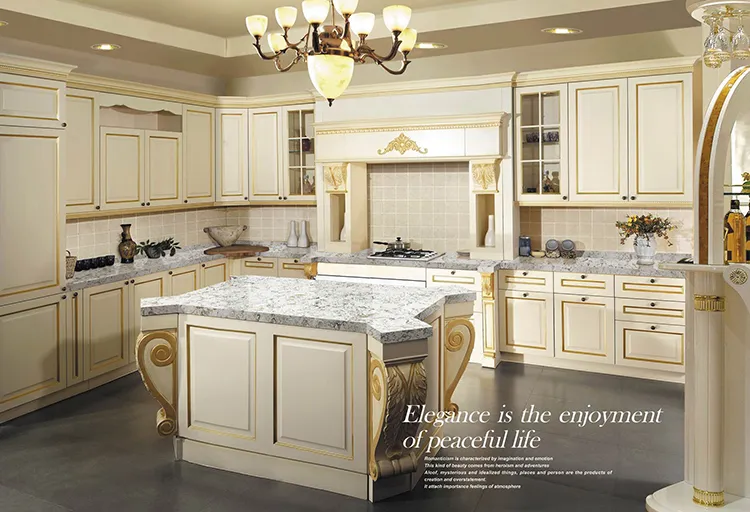
What Do You Need to Know About Quartz Countertops?
Quartz countertops may look similar to natural stone, but they have several unique advantages and limitations compared to natural stone.
First, quartz is impeccably durable. Not only does it have excellent scratch resistance, it’s also heat resistant. This makes it an ideal choice for kitchen countertops that can withstand the daily wear and tear of cooking. However, while quartz is somewhat resistant to high temperatures, it’s not recommended to place overheated pots and pans directly on quartz countertops. Excessive temperatures can damage the resin component of the surface, so it’s a good idea to use a heat-insulating mat.
Second, quartz countertops are very easy to care for. It doesn’t require regular sealing like granite or marble, as its non-porous surface naturally blocks stains. When it comes to cleaning, warm water and mild detergents can easily handle everyday dirt without the need for special stone cleaners.
However, quartz countertops are not without their drawbacks. Although it excels in many aspects, quartz countertops can fade under long-term exposure to UV rays. Therefore, if you plan to use quartz outdoors, you may want to think twice. Quartz is suitable for indoor use, especially in kitchen and bathroom environments, where it performs best.
What Are the Most Popular Quartz Countertop Colors?
In home design, the choice of color often reflects the owner's personal taste, and the diverse selection of quartz countertops allows designers and owners more possibilities. Among the various options, white quartz countertops are undoubtedly one of the most popular colors. It not only shows a clean and bright aesthetic, but also blends seamlessly with various kitchen styles.
White quartz countertops have soft textures and sometimes marble-like patterns. This design is very suitable for minimalist, modern kitchens. Whether it is paired with stainless steel appliances or contrasted with dark cabinets, white quartz countertops can create a pleasing visual effect.
In addition, gray has gradually become another popular color choice in quartz countertops. Gray has the characteristics of low-key elegance. It is not too eye-catching, but it can add a sense of luxury to the space. Gray quartz countertops are especially popular in modern and industrial style kitchens.
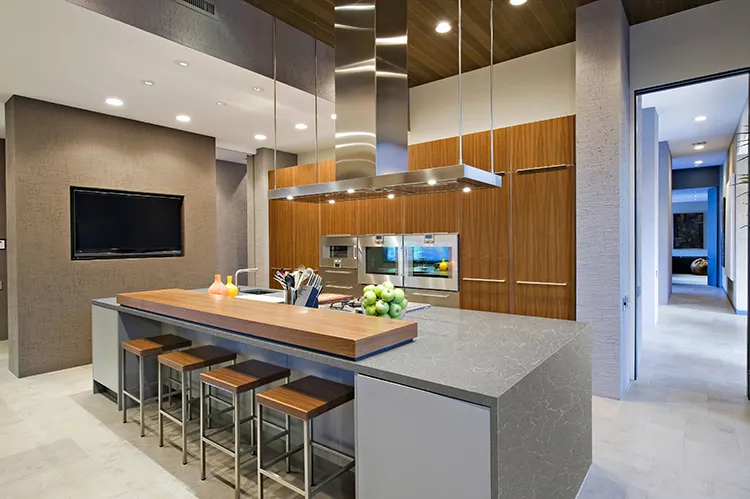
What Is the Most Popular Quartz Color for the Kitchen?
In kitchen design, it is crucial to coexist between function and aesthetics, and the color selection of quartz countertops finds a balance between the two. In addition to white and gray, dark-toned quartz countertops are also popular, especially black quartz countertops with white textures.
Black quartz countertops not only show a modern feel, but also have a unique drama, especially when paired with white cabinets, creating a strong visual contrast. If your kitchen has modern appliances and metal finishes, black quartz countertops will give people a simple and high-end atmosphere.
In addition, quartz countertops can also be customized according to personal needs, such as adding gold or blue textures to create a more unique effect. This customized design makes each quartz countertop a unique work of art in the kitchen.
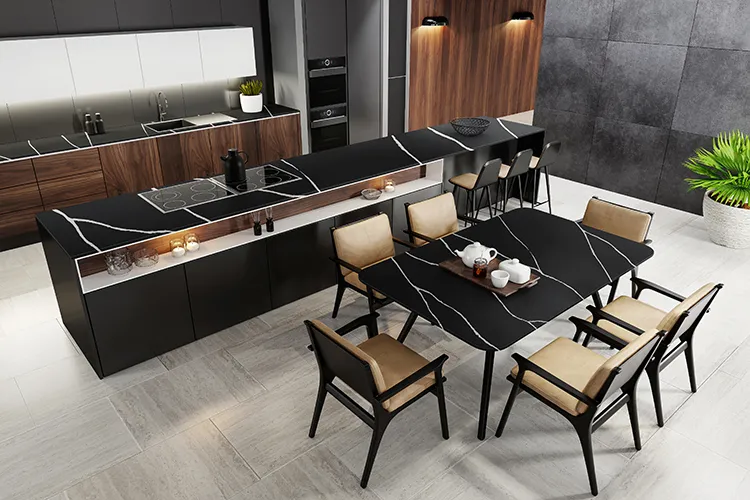
What Are the Disadvantages of Quartz Countertops?
Although quartz countertops have many advantages, they are not perfect. When choosing quartz countertops, it is also crucial to understand its disadvantages.
Disadvantage 1
Quartz countertops are relatively expensive. Although it costs less than some high-end natural stones, such as marble or granite, it is still more expensive than most synthetic materials or laminates. If you are on a limited budget, quartz countertops may not be the most economical choice.
Disadvantage 2
Although quartz has great heat resistance, it is not completely immune to extremely high temperatures. Placing a hot pan directly on the countertop may cause the countertop to discolor or damage the surface resin. Therefore, extra caution is required in kitchen use, and the use of heat insulation pads and tripods can effectively avoid such problems.
Disadvantage 3
Quartz countertops are not suitable for outdoor use. The resin component of quartz will fade under ultraviolet light, so long-term exposure to sunlight will damage the countertop surface. For those who want to use quartz countertops in outdoor kitchens, other materials may need to be considered.
Finally, although quartz's non-porous surface is very stain-resistant, its seams can be a potential weak point. If the seams are not handled properly during installation, stains may accumulate in the seams and be difficult to clean.
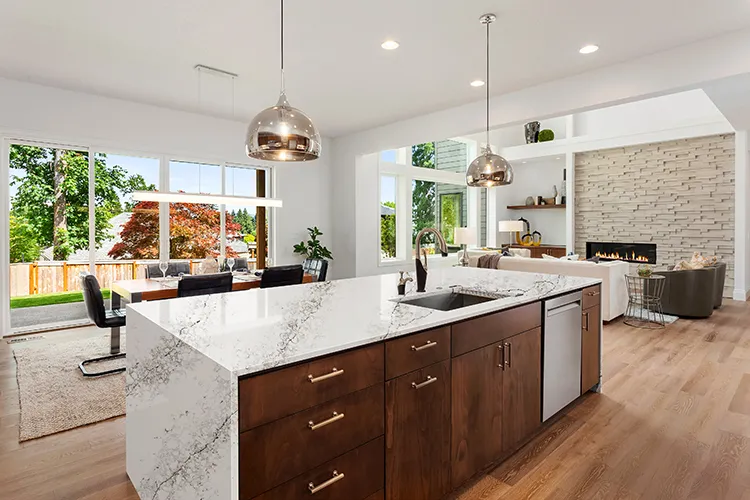
Can You Put a Hot Pot on Quartz?
Let's get straight to the point and answer one of the most common kitchen confusions: it is not recommended to place hot pots directly on quartz countertops. Although quartz countertops have a certain degree of heat resistance in most cases, due to the resin contained in their internal structure, when the countertop is affected by high temperatures, it may cause the surface resin layer to discolor, bubble or even crack.
Quartz is heat-resistant, but not "heat-proof"
Quartz is made by adding about 90-93% natural quartz minerals, plus a small amount of resin and pigment. Although quartz minerals can withstand extremely high temperatures, resins may be thermally deformed when exposed to overheated objects (such as pots directly removed from the stove) for a long time. Therefore, although it is not a problem to touch warm objects for a short time, it is recommended to use insulation pads in daily kitchen operations to avoid unnecessary damage.
Tips:
1. Insulation pads are your good friend. Whether it is a freshly cooked soup pot, baking tray, or hot water kettle, it should be placed on insulation pads or pot racks to avoid direct contact with high temperature on the countertop.
2. Pay attention to temperature differences. Quartz countertops are easily damaged by rapid temperature changes. Therefore, avoid placing extremely cold objects directly on the countertop and then placing hot objects immediately afterwards.
What Are the Rules for Quartz Countertops?
The rules for quartz countertops are actually very simple, mainly focusing on keeping the countertop beautiful, functional and long-lasting. The following rules can help you better use and maintain quartz countertops:
Rule 1: Daily cleaning is essential
Quartz countertops are easy to clean and can be kept smooth by wiping them with a damp cloth and mild soapy water every day. Its non-porous nature means that stains will not easily penetrate the material, but regular cleaning can prevent the accumulation of stubborn dirt and water stains.
Rule 2: Avoid using strong acid or alkaline cleaners
Although quartz countertops are highly resistant to chemicals, it is still recommended to avoid using strong cleaners such as bleach and strong acids. These products may damage the resin layer on the countertop, which will affect the gloss and color of the countertop.
Rule 3: Prevent direct contact with sharp objects
Although quartz countertops are very hard, they can still be scratched by knives or other sharp objects. It is recommended to always use a cutting board when using knives to avoid cutting ingredients directly on the countertop.
Rule 4: Avoid long-term UV exposure
Although quartz countertops are rarely exposed to strong direct sunlight when used indoors, the color in the resin may fade over time if the quartz countertop is exposed to UV rays for a long time (such as outdoor kitchens). Therefore, quartz countertops are more suitable for indoor use.
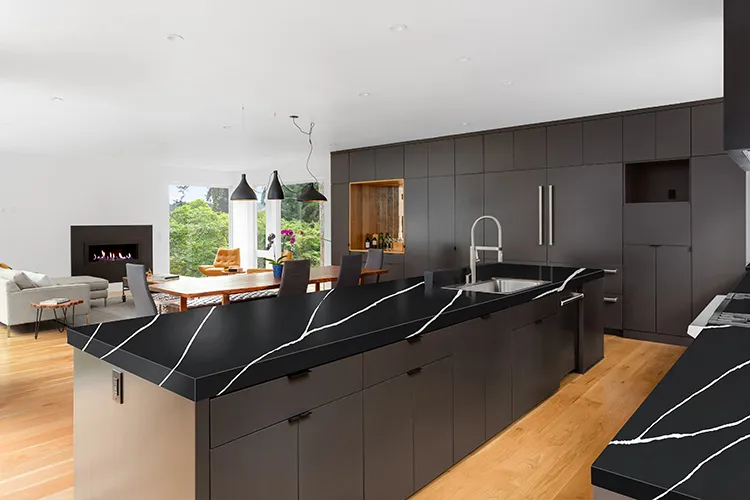
Are Quartz Countertops High Maintenance?
The answer is no, quartz countertops are very low maintenance. Compared with natural stones such as marble and granite, quartz requires almost no regular sealing or professional maintenance. Here are some specific reasons:
Quartz countertops do not require sealing treatment
Natural stones such as marble and granite usually require regular sealing treatment to prevent stains from penetrating the pores of the stone. However, quartz countertops do not require sealing treatment at all due to their non-porous nature, saving a lot of time and cost.
Daily cleaning is simple and easy
Quartz countertops are very simple to clean, without the need for special cleaners or equipment. Just regular soapy water and a soft cloth can clean the countertop, eliminating many complicated steps and extra expenses.
Long life, reduced replacement costs
Quartz countertops are very durable, resistant to wear and stains, and can last for decades. Compared with other materials that require regular maintenance or even replacement, the longevity of quartz countertops makes it a more cost-effective choice.
Does Quartz Yellow Over Time?
For families who pursue a perfect appearance, this question is very important: quartz countertops will not turn yellow easily, but under certain specific conditions, long-term exposure to strong UV rays or uneven heating, the surface of the countertop may slightly discolor. Here are some reasons why quartz countertops may turn yellow and how to avoid this:
Reason 1: Excessive sunlight exposure
Although quartz countertops are usually installed indoors, if the countertops are exposed to direct sunlight for a long time, UV rays will cause the pigments in the resin to decompose, especially white quartz countertops, which may show slight yellowing. Therefore, when using quartz countertops outdoors, it is best to use sunshade measures.
Reason 2: High temperature effects
The resin may discolor when exposed to hot objects for a long time or without proper insulation, especially light-colored countertops such as white quartz. To avoid discoloration, always use heat-insulating pads and avoid direct exposure of the countertop to high temperatures.
Reason 3: Using improper cleaning agents
Certain chemical cleaning agents, especially those containing bleach or strong acid ingredients, can damage the gloss of the quartz surface and may cause discoloration. To avoid this problem, always use a mild neutral cleaning agent.
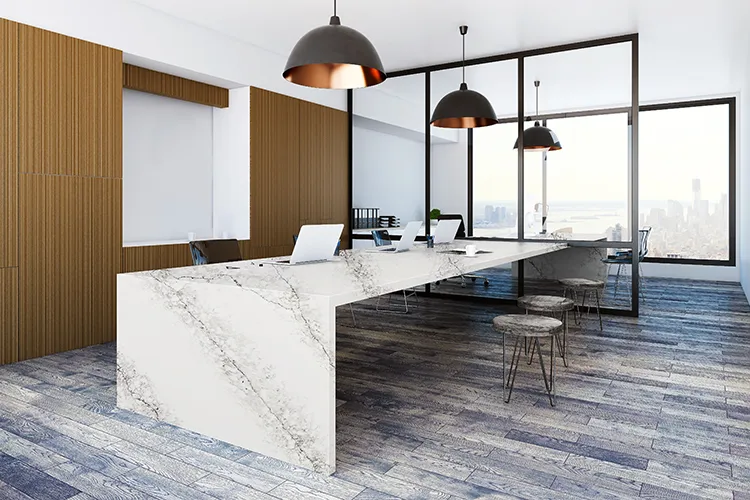
Does White Quartz Scratch Easily?
White quartz countertops will not scratch easily, but it is not completely scratch-proof. Quartz countertops have a high hardness, but in some extreme cases, scratches may still be left due to improper use.
Scratch resistance in daily use
Quartz countertops have a Mohs hardness of 7, which is harder than most kitchen utensils and everyday items. Therefore, in normal kitchen operations, such as cutting vegetables, preparing food, etc., quartz countertops can resist minor scratches well. However, in order to keep the countertops perfect, it is recommended to avoid using knives without a cutting board.
Advantages of white countertops
White quartz countertops not only add a bright feeling to the kitchen, but also bring a clean, modern look. Although white countertops may visually show scratches and stains more easily, they are actually just as scratch-resistant as other quartz countertop colors.
How to prevent scratches?
1. Use a cutting board: Whether you are cutting vegetables or handling other food items, always use a cutting board instead of working directly on the countertop.
2. Avoid dragging heavy objects across the countertop: If you need to move heavy pots or other items, it is recommended to lift rather than drag to avoid unnecessary scratches.
Can You Put a Hot Cup of Coffee on Quartz?
For families who need a daily coffee pick-me-up, the answer is important: you can safely place a hot cup of coffee on a quartz countertop. Quartz countertops have good heat resistance and can withstand the temperature changes common in daily kitchens.
Small cups of hot drinks are no problem
Since the temperature of hot coffee or tea is relatively low, quartz countertops can easily handle these temperature changes. Compared to hot pots or baking sheets, hot coffee will have a negligible impact on the countertop.
Notes on long-term high-temperature exposure
While quartz countertops can easily handle the temperatures of everyday hot beverages, prolonged or frequent placement of extremely hot objects directly on the countertop may still affect the resin layer of the countertop. Therefore, while placing a coffee cup will not cause harm, it is still recommended to take extra precautions when using hotter items, such as using an insulating mat.

